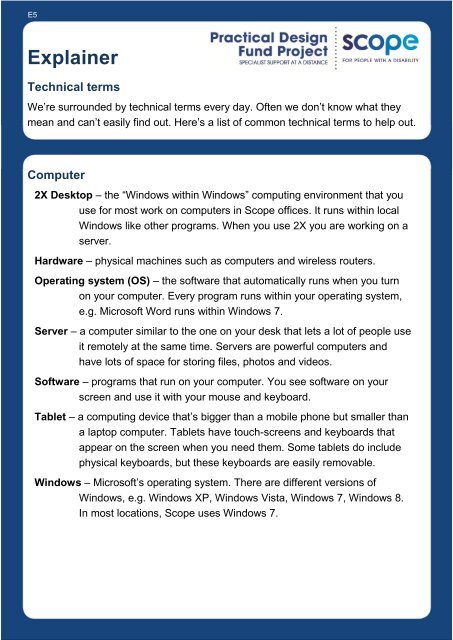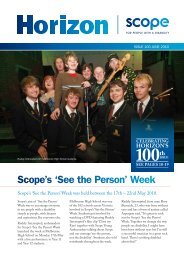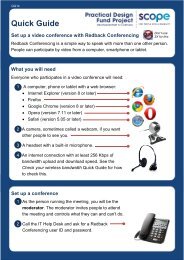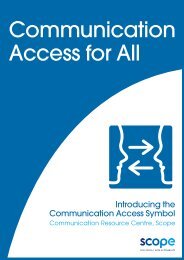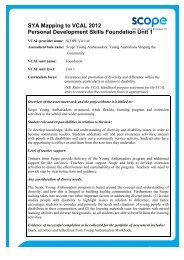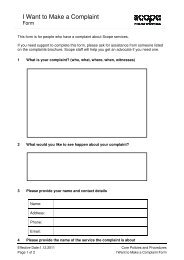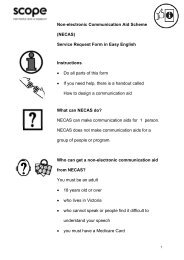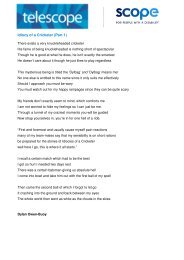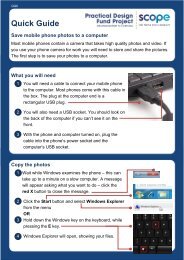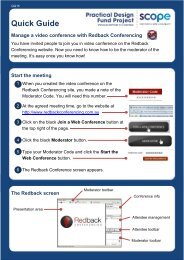Explainer: Technical terms - Scope
Explainer: Technical terms - Scope
Explainer: Technical terms - Scope
- No tags were found...
Create successful ePaper yourself
Turn your PDF publications into a flip-book with our unique Google optimized e-Paper software.
E5<br />
<strong>Explainer</strong><br />
<strong>Technical</strong> <strong>terms</strong><br />
We’re surrounded by technical <strong>terms</strong> every day. Often we don’t know what they<br />
mean and can’t easily find out. Here’s a list of common technical <strong>terms</strong> to help out.<br />
Computer<br />
2X Desktop – the “Windows within Windows” computing environment that you<br />
use for most work on computers in <strong>Scope</strong> offices. It runs within local<br />
Windows like other programs. When you use 2X you are working on a<br />
server.<br />
Hardware – physical machines such as computers and wireless routers.<br />
Operating system (OS) – the software that automatically runs when you turn<br />
on your computer. Every program runs within your operating system,<br />
e.g. Microsoft Word runs within Windows 7.<br />
Server – a computer similar to the one on your desk that lets a lot of people use<br />
it remotely at the same time. Servers are powerful computers and<br />
have lots of space for storing files, photos and videos.<br />
Software – programs that run on your computer. You see software on your<br />
screen and use it with your mouse and keyboard.<br />
Tablet – a computing device that’s bigger than a mobile phone but smaller than<br />
a laptop computer. Tablets have touch-screens and keyboards that<br />
appear on the screen when you need them. Some tablets do include<br />
physical keyboards, but these keyboards are easily removable.<br />
Windows – Microsoft’s operating system. There are different versions of<br />
Windows, e.g. Windows XP, Windows Vista, Windows 7, Windows 8.<br />
In most locations, <strong>Scope</strong> uses Windows 7.
Communication<br />
3G, 4G – the wireless (radio) system used by mobile phones for speech, and by<br />
many computing devices for transmitting data. 3G and 4G signals can<br />
travel a long way. Phones and tablets often connect directly with 3G<br />
and 4G, but computers usually need a USB device called a 3G<br />
dongle.<br />
Network – two or more computers connected together, including the cabling<br />
and other equipment that makes it work.<br />
USB –<br />
Wi-fi –<br />
a way of connecting devices to computers. A USB cable is usually<br />
plugged into the computer and device, although some devices like<br />
USB flash drives plug directly into the computer without a cable.<br />
the wireless (radio) system that computers use to talk to local<br />
networks. Wi-fi can be very fast but its radio signals don’t travel far.<br />
Storage<br />
Compact disc (CD) – a 12cm flat disc that stores music for playing on a CD<br />
player or stores data for reading by computers. Usually stores around<br />
74 minutes of music or 700MB of data.<br />
Digital versatile disc (DVD) – disc that looks almost identical to a CD but<br />
stores video for playing on a DVD player or stores data for reading by<br />
computers. A DVD stores much more than a CD – usually two hours<br />
of video or 4.7GB of data.<br />
Flash drive – a small and portable solid state drive (see below) that connects to<br />
the computer’s USB port.<br />
Hard drive – a physical device for storing computer files. Usually 3.5” or 5”<br />
wide, hard drives can be installed into computers or in portable cases.<br />
Most hard drives contain disks that spin at high speed, and store files<br />
using magnetism.<br />
Solid state drive (SSD) - newer hard drives have no moving parts – they are<br />
made of solid silicon. They’re very fast, use less power and are hard to<br />
break. They’re also very expensive.
Data measures<br />
Bit – the smallest building block of data<br />
Byte – a byte is 8 bits, enough to store one letter of the alphabet.<br />
Kilobyte – 1KB = 1024 bytes, around enough storage for one page of text.<br />
Megabyte – 1MB = 1024KB, about a thousand pages of plain text.<br />
Gigabyte – 1GB = 1024MB, enough to store around 250 images from a modern<br />
digital camera.


